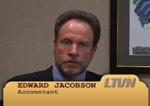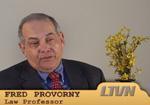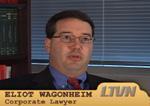Business Valuation
EDWARD JACOBSON: It is amazing how many people come to me and they say what is my business worth, they have no idea.
ELIOT WAGONHEIM: There are several ways to find out one is to work with an experienced business broker or to pay a private side of industry such as an investment banker these people will have a feel for what a business is worth.EDWARD JACOBSON: Not knowing what it is worth is the biggest question mark that any perspective buyer has or even any seller has.
ELIOT WAGENHEIM: If for example, you are purchasing a business that is in a different industry, an industry with which perhaps you are not as familiar, it may be a good idea to get a business evaluation.
EDWARD JACOBSON: In simplistic terms, the business is worth what it can generate in earnings.
FRED PROVORNY: You really need to get an effect into the bowels of the company and see what makes it tick.
EDWARD JACOBSON: Some businesses will run through personal expenses, some businesses will either overpay the owner or underpay the owner.
FRED PROVORNY: In the words of the late President Reagan, trust, but verify.
What's the Business Worth?
A realistic business valuation requires more then merely looking at last year's financial statement; it requires a thorough analysis of several years of the business operation and an opinion about the future outlook of the industry, the economy, and how the subject company will compete.
Most people believe that a business should be sold for Fair Market Value. The IRS defines fair market value as "the price at which the property would change hands between a willing buyer and willing seller when the former is not under any compulsion to buy and the latter is not under any compulsion to sell, both parties having reasonable knowledge of relevant facts."
Unfortunately, IRS agents haven't the time or expertise to appraise your business for you. That's a more difficult issue that often requires business valuation experts or accountants with experience in such matters.
In short, there are a number of different methods to determine a fair and equitable price for the sale of the business. The following lists a few methods to determine the price:
- Capitalized Earning Approach - This method refers to the return on the investment that is expected by an investor
- Excess Earning Method - This method is similar to the capitalized earning method, except that it splits off return on assets from other earnings
- Cash Flow Method - This method is usually used when attempting to determine how much of a loan the cash flow of the business will support. The adjusted cash flow is used as a benchmark to measure the firm's ability to service debt
As Ed Jacobson said in this segment, there are some basic formulas that are often used. But he correctly cautions us that rote formulas never tell the whole story and it is exceedingly wise for buyers and sellers to consult with their accountants and business valuation experts to get the right price.




